#online jobs in nigeria 2018
Explore tagged Tumblr posts
Text
Government failures and fucked-upperies in France
Ok, so I recently wrote a bit about the situation with police brutality in France, but now I would like to tell you more about WHY the government needs the police so much. A lot of my sources will be in french (and marked (F) like this) because there are a lot of cases that didn’t make it to the international press. Many sources also come from the newspaper Mediapart and require a subscription.
I’ve had a lot of people telling me “BuT It’S nOt ChInA” and let me tell you, yes I know it’s way worse in other countries (Peru, Thailand, Nigeria and so on, a lot is happening right now in the world), but where the fuck do you draw the line? The kind of things I’m gonna tell you about is unacceptable, and so hypocritical when a country calls itself a democracy and the land of human rights, and we should be angry about that and try to make it change. Here I’m talking a lot about Macron but let’s not forget that many current problems began under Holland’s presidency, who was supposed to be from the left, and even before. Alright, here we go.
President of the wealthy
Soooo let’s begin with how Macron was elected by wealthy people: half of the 16 million euro collected for his campaign was financed(F) by 1200 people, mostly living in Paris, by banks, and also by rich french people living abroad. So of course the first thing he did when he could was to reward them for his victory and he cut their taxes in december 2018. He deleted the “taxe on fortune” that was in place for 40 years (minus 3 years under Chirac first presidency) and replaced it with another that taxes way less, in the name of trickle down economy (you know, the same way Thatcher and Reagan did) saying that rich people would invest more and thus creating more jobs. Of course that didn’t happen and rich people just got way richer without any effects on poor people.

At the same time, he cut down housing benefits for students and poor people (1/4 of people between 18 and 24 are under the poverty line) and cancelled housing helps for 50,000 people. In december 2018, he wanted to pass a law that would increase fuel prices in the name of ecology, but that would once again mainly affect working and middle classes. That’s how started the yellow vest movement, because people were becomming poorer and poorer and they felt like the government only gave to the rich and took from the poor.
In 2018, 14% of the french population was under the poverty line, and 21% suffer from food insecurity and it has only worsened since.
At the end of 2019, a student even set himself on fire at his university because he was in such financial distress he couldn’t go on anymore.
Yellow Vest movement
If you have to read one article about it, it’s this one.
In 2017, Macron said in one of his speeches about a train station that it was “a place where one encounters people who are succeeding and people who are nothing”. The yellow vest movement came from these “people who are nothing”. For the first time in decades, people who were not heard, people who didn’t have a place in the political landscape in France were on the front scene. A lot of protestors never demonstrated before, or even engaged in politics. Many of them now protested because “they had nothing else to lose” (F). People were angry from not being listened to and being used only to allow rich people to get richer, and oh boy they showed it in the street.
The first protests took the government by surprise. They were not expecting the numbers of protestors, nor their determination. The protest were also completely different from the demonstration the state was used to deal with: there were no official leaders, making it really difficult for the government to negotiate, demonstrations were often not declared beforhand in prefectures (F), and people were systematically targetting (F) banks, major brands like Apple or McDonalds and luxury shops, causing millions euro worth of damages.
On the 1st of december 2018, protestors in Paris took over the Arc de Triomphe and completely overfloaded the police.
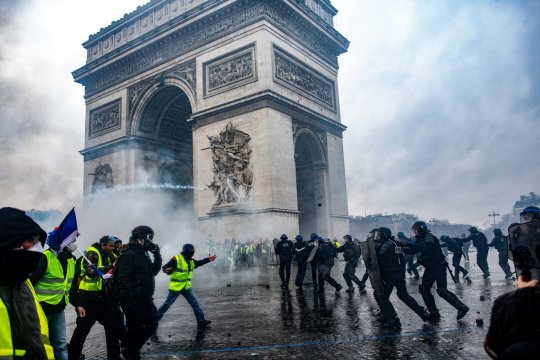
One policeman said afterward that on this day, “the Elysée could have fallen” (F). Police forces were not prepared, the right orders were not given at the right times and some police company were surounded by furious protestors. The same policeman said that in that moment, “they forgot about their code of ethics”, that they were just shooting rubber bullet wherever they could and “trying protect their life”. The following weeks, police put on steel fences around the Elysée and members of the government and their collaborators were asked to lock down and put away all of their documents(F) before the weekly demonstrations, in case the protestors were able to take over the buildings.
It was a turning point in the protests, and from then the orders given to the police changed completely. From then they’ve been allowed to litterally do whatever it took to keep the country in order. The government understood that the last thing between them and the furious people they betrayed was the police, and that’s precisely why they are trying to give them even more power today with the law on global security (see my last post, and probably a next one I’m gonna write soon because it would be too much for this post).
Since December 2018, a journalist, David Dusfresne, documents and keeps count on the police brutality, first on twitter and then on the online newspaper Mediapart(F) (TW for really graphic pictures of wounds and blood). For now he counted 4 deaths, 30 people who lost an eye due mainly to rubber bullets, 6 who lost a hand due to detonative grenades (France is being the only european country to use them against its own population), 346 wounded to the head (fractured skull mainly, due to the rubber bullets and baton blow) and a total of 969 documented reports on police brutality (and that’s only for 3 years).
Since then, a total of 9 police officers have been judged guilty, 7 of them being only suspended temporarily and avoiding prison, with only 2 of them ending up in prison(F) and being expelled from police forces.
People began to record the police more and more to prevent any brutality or to have proofs in case it happened, and then the police began to target journalists and anyone who had a camera.

They began to lie to people, telling them it’s forbiden to record the police (for now it isn’t), they forced photographs to delete their photos in the middle of demonstrations. They covered their ID number on their uniform (F), they covered their licence plates.
The government also began to talk about legitimate protest, aka the peacefull one, and put the name of “casseur” (thug) on anyone who would be too angry. to their taste, saying that the latter were taking the former in hostage. Basically they were saying tht yes, protestors took aver the arc de Triomphe, but it was only hooligans who just wanted to burn things, nothing political behind that.
Here began the preventive arrests (F) before demonstrations (arresting people who had done nothing on the only presumption they will), the arrest of journalists, the arrest of people having masks and protection glasses on them. From now on the administration can ban someone from public demonstration without going through the justice system.
Between November 2018 and November 2019, around 3,000 person(F) from the yellow vest movement were senteced to community services, fees, suspended prison sentence, and for 1/3 of them prison sentences. Those numbers are underestimated because many cases have not been judged yet. Some protestors were sentenced for shouting slogans(F), for wearing protective masks(F) (F), other were sent to prison for damaging radars(F) on highways, or for filming riots while wearing a yellow vest(F). There has been a massive tendency(F) for the state to sue people for “participation to a gathering with the intent to commit violences against persons or goods”, allowing them to give fees, community services or even prison sentences to people based only on the intent they gave them. Many people found guilty of attacking police forces were judged with the only proof being the declaration of police officers, and even though a lot of them claimed to be innocent they were still sentenced because they couldn’t bring proof of their innocence.(F) Amnesty International talks about the criminalization of demonstrators(F) that’s happening in France and warns about the instrumentalisation of laws that goes against international law. (F)
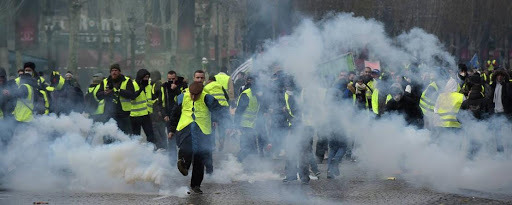
The ban on masks (they can be considered as weapons) during demonstration allows police to take protestors(F) who have some on them or in their car to the police station for a maximum of 48h for the sole purpose of making them miss the demonstration. This law is not applied nowadays because of Covid, but it still exists.
With the yellow vest movement, the part of the population who wasn’t used to the police actually began to endure what POC have been living for decades.
Racisme
France is a fucked up racist country. It was born in colonisation and slavery, and still rely on its former colonies to prosper economically. Young men perceived as Black or Arab are 24 more times likely to be stopped in the streets. The overwhelming majority of people killed by the police are black or arabic(F). When the police kills POC, the judiciary system often refuses to do a full investigation, refuses to hear some of the witnesses, refuses to watch some of the video tapes from surveillance cameras (F). A lot of autopsies are proved to be ballant lies, founding heart diseases(F) or blood infections(F) when the victim was actually killed by suffocation due to ventral tackle, a police technique that got France sentenced by the European court of human rights (F).
BAC
Since the mid 90′s, France has special police forces for working-class neighborhoods, the Brigade Anti-Criminalité (BAC), that operate in suburbs (in France rich people live in the city center and poor people in the suburbs) where a majority of imigrants and people from black and arabic descent live. BAC agents are all volunteers, they act in unmarked cars and civilians clothes and can carry weapons(F).

Their purpose is to roam the streets and to catch misdemeanor in the act, and they’ve been known (as well as regular police) to harass population by proceeding to systematic identity cheks(F) (often outside of what’s allowed by law), by insulting people(F), provoking people with racist and homophobic insults(F), by beating them(F) and charging them for “outrage” or “rebellion”(F) when they protest (charges that always give reasons to police officers when there’s no recordings of the arrest and allow them to get money for the prejudice). There have been reports of torture on adults(F), tennagers(F) and children(F), and cases where the BAC agents took victims to quiet places so they could beat them up(F). There have also been reports of agents inventing charges when their provocations didn’t push the victim to confront them(F).
They are basically above the law. There have been cases of massive corruption(F) where the agents returned to their unit(F) after the end of their suspension, and the person who leaked the info got fired.
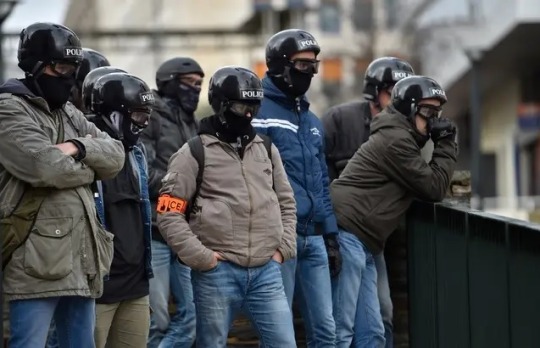
As they are field agents, their role is also intelligence: they gather intells in the suburbs and they also infiltrate demonstration(F) and wear the attire of “casseurs”, to gather intells on violent individuals. Since the beginning of the Yellow Vest movement, they’ve participating in containing demonstrations as well even though they don’t have any training in that field.
Refugees
Police is being extremely violent against refugees, particularly in Northern France and what used to be the “Jungle” of Calais. Amnesty International reported that police had been beating refugees with baton, confiscating their clothes and tent daily during winter (it also happened in Paris(F)), urinating on their tents, spraying teargas directly in the face of sleeping men. A group of 4 associations also issued a report(F) on police harassment against volunteers who helped refugees, with as much as 646 instances of police harassment and abuse against volunteers between November 2017 and June 2018 in Calais. Human rights observers reported harrasment techniques such as body search of female volunteers by male officers, insults, pushing, threats of legal suits and threats of arrest. Volunteers who reported these behaviours were told by the police internal investigation body that the reports where defamatory and could constitute a crime.
At the beginning of the year, associations that were not approuved by the state were forbidden to distribute free meals to refugees(F).
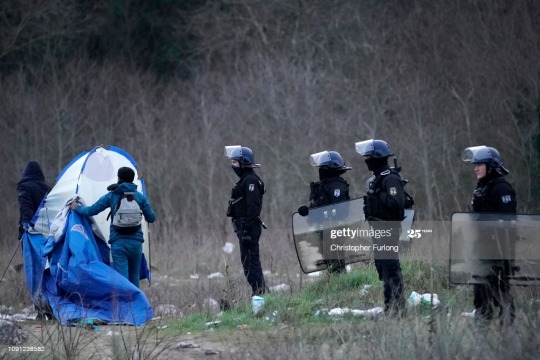
Islamophobia
France has always been an islamophobic country but it has been more public and accepted since the 2015 terrorist attacks. Many laws promoting laicity are actually used to target Islam:
The ban of public display of religious items in public institutions (schools, libraries, government buildings) target mainly women wearing hijabs when many mayors keep on installing nativity scenes during Christmas(F). In 2016 some cities made wearing a burkini (full body covering bathing suit) on the beach illegal and we had some astonishing scenes of police officers asking a women (who wasn’t even wearing a burkini) to undress on the beach in the name of the law.
The law that says people have to uncover their face when being in a public space only target muslim women and is now completely useless as we have the obligation to wear a mask everywhere
The law that says street prayers have to be autorized in prefecture beforehand only target muslim community: when a muslim association organized a street prayer(F) in 2017 to protest their eviction from their place of cult in the city center they were charged 10,000€ (5,000€ from the association and 5,000€ from its president), whereas catholics students organized a street prayer(F) last month and didn’t face any charges. Legally, any autorization must be asked more than 3 days in advance and in both cases it was only asked on the day before.
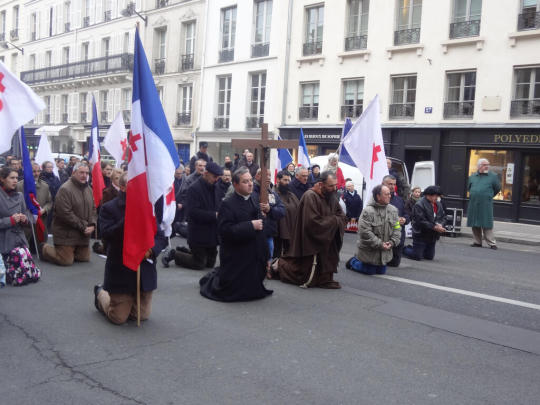
Following the killing of Samuel Paty, a teacher who was attacked mid october for showing caricatures of the prophet Mohamed in class, four 10 years old children were arrested for “terrorism apology”(F), interrogated for 10 hours and their houses checked by police forces in full gears. The minister of interior also disolved the Collective against Islamophobia in France, saying that, since it was prottesting against anti-terrorist laws (that are super islamophobic) it was promoting radical islamism and terrorism. A minute of silence was imposed in schools and the names of people who didn’t follow the procedure were given to the minister of education, who said “none of them will be left unpunished”.(F)
To sum up: the government is being super islamophobic but muslims who voice their concerns are seen as radical islamists and are associated with terrorists. Furthermore, it’s now easier for islamophobic people in government to ban associations or to pass shady laws thanks to the state of emergency.
State emergency
Following the 2 years of state emergency (2015-2017), France passed a law against terrorism(F) that normalized a lot of the state emergency’s characteristics: it took power away from the justice system to give it to administrations, directly under the control of the government.
The government, who previously had to be accountable in front of a judiciary judge, can now do many things under the only control of an administrative judge(F). The actions of administrative judges are controled by the council of state, and the president of the said council is the prime minister or the minister of justice, named by the president.
Here is what they can now do(F):
place people under house arrest with obligation to check in police stations every day for a maximum of a year
deny or restrict access to public events to some people, or proceed to body search
make someone wear an electronic bracelet when they didn’t commit any infractions
close places of worship for a maximum of 6 months when the ideas discuted there promote hate, discrimination, violence or terrorism
require people to give their login of any account on internet to the police
investigate on civil servants using secret services files
create a national centralized file with the names of people travelling in and out of the country by plane or boat
With the autorisation of a judge of freedom and detentions, they can also search houses and seize computers or phones to inspect the contents.
If people refuse to do any of the above when they are asked to, they risk 3 years of prison and a fee that can go up to 45,000€.
The offense “terrorism apology” was used against hundreds of people, with a large proportion of them being underaged (1/3 of them in 2015), sometimes for something as unsignificant as a non-violent facebook comment, a situation pointed out by Amnesty International(F). The NGO also highlights the fact that the fear of being considered as an extremist or the fear of facing judiciary consequences sets limit to freedom of speech.

Since 2015, the government has used the power given to them by the state of emergency to place 24 environmental activists under house arrest for the duration of the COP21(F) and to search the house of people who were protesting against the construction of an airport(F), construction potentialy linked to corruption(F), and also to close temporarly more than 30 mosques and install security cameras inside(F).
The consulting national commission on human rights pointed out a “highjack” of the state emergency, that was used to silence protestors, unions and refugees with abusive means, like unnecessary handcuffing, adults and children being aimed at with assault riffle during house searches and house being damaged during searches.
2015 was also the year of the Intelligence Act, a law that allows inteligence agencies to install scanning devices on the infrastructure of telecom operators so they can collect data on communications that are likely to reveal a terrorist threat.
Covid 19
When the epidemy started to be problematic in France in February 2020, hospital workers had been on strike for 11 months(F) and were asking for doctors and nurses jobs opening, and more beds in hospital. At the beginning of february, 600 administrative hospital workers had quit(F) so they were not “accomplices of the management of misery”. Healthcare workers had been saying for years that the deterioration of the working conditions in hospitals were gonna lead to patients death.
Since the beginning of the 2000′s, 100 000 beds have been removed(F) from hospital services and there has been a budget cut close to 12 bilions euros(F) for the health services.

Then comes Covid 19, and the government asks health workers to always do more with less, in the name of common good. We applaud them at our windows every night, and then they don’t get the bonus(F) the government promised, the healthcare system doesn’t get any budget increase and even worse, it still has to face a 800 milions cut in the middle of the pandemic(F).
The newspaper Mediapart issued a report(F) exposing the lies of the government:
They decided to get only small quantities of masks at the beginning of january against experts opinion, they said the virus wouldn’t reach France.
Government lied about the usefullness of masks to prevent people asking for them when they didn’t have some to distribute to the whole population. They said it was useless, and even dangerous because we didn’t know how to use them, they actively encouraged people not to wear them, and they lied about mask shortage. I really want to insist on that point, the instensity of communication on the subject was incredible. Every day we had many different high-ranked person in the government telling us on TV, on the radio or in newspaper that we shouldn’t wear masks. They only made wearing masks compulsory in public spaces mid July, 6 months after the first case in France(F).
Healthcare workers didn’t have enough masks and thus faced higher risks of contamination but the government still allowed non essential big companies like Airbus to use milions of the precious FFP2 masks. The government still refuses to give the number of healthcare workers who died from Covid19(F), the only count we have is made by journalists, and it’s believed to be underestimated.
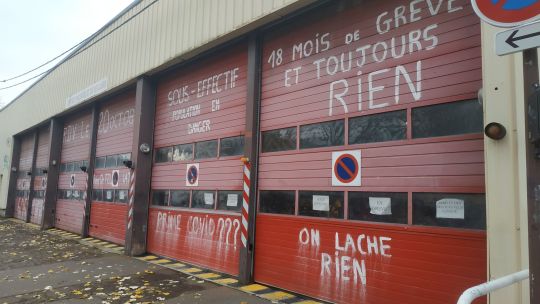
To this day, healthcare workers are still on strike for better working conditions and better pay. I took this pic earlier this month from one of the firestations in my city, you can read written in white paint on the doors “understaffed, population in danger”, “18 months of strike and still NOTHING”, “Covid bonus ???” and “SOS”. Firefighters also write this on their trucks and their helmets, and hospitals have had banners deployed for more than a year now. All of these people are still working to ensure everyone’s access to health services but they refuse to transfer data to the state sickness insurance for example (and they are now facing administrative sanctions(F) and are threatened to not be given cancer drugs if they don’t end the strike(F)).
Regarding Covid, we are one of the only countries in europe to use self-filled certificates to be able to go outside. These certificates are controlled by the police, and like I said earlier, increased police controls harm a certain part of the population (young people and POC). Amnesty International issued a report(F) on the violences comited during french lockdown, pointing out repetitive and significant illegitimate actions from the police, such as beatings, use of tasers, illegal arrests, racists and homophobics insults and verbal threats. In April 2020, Mohamed Gabsi, a homeless person, was killed by the police after being arrested for being outside during the lockdown(F). The officers who killed him are still in service.
The covid crisis brought us in the worst recession we had since WW2, and the Secour Populaire (french association that helps poor people) had to help 45% more people than it helped in 2019(F). In my city, there are so many people coming for food distribution on certain days they had to install permanent fences in the street so people can queue in order.
Corruption and Other Stuff
In France (as in many other countries) it’s rare to have politicians who’ve never been prosecuted in any judiciary or administrative case.
Here I’m only gonna tell you who have been accused and who have been prosecuted for what in Macron’s government, and quite frankly it’s not exhaustive because one wikipedia page just brings me to 5 more.
The following tab is quite heavy so feel free to just check the left column with the legend.
(Now let me cry thinking about this Swedish minister who had to quit over a chocolate bar)

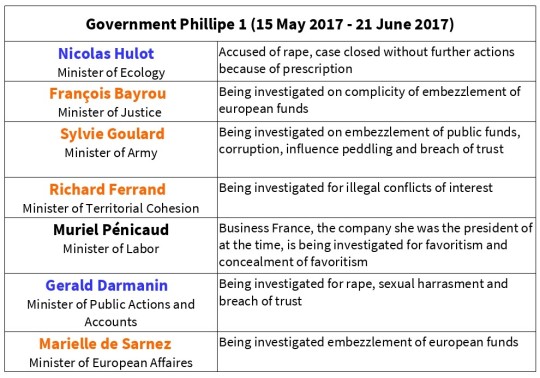
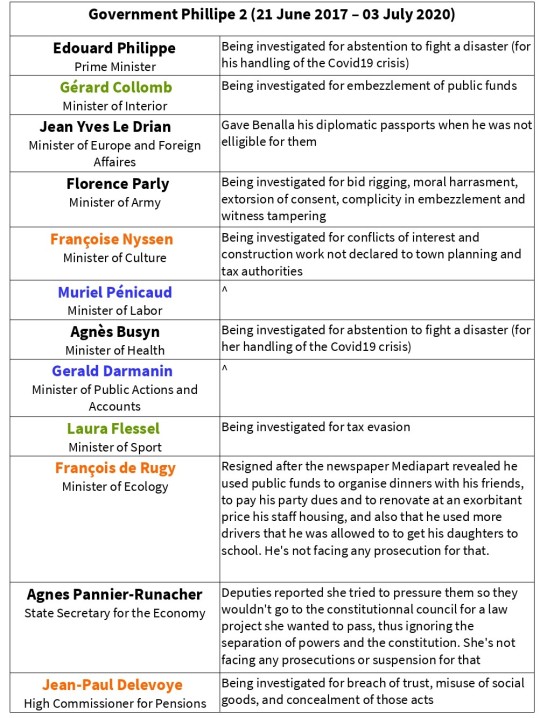
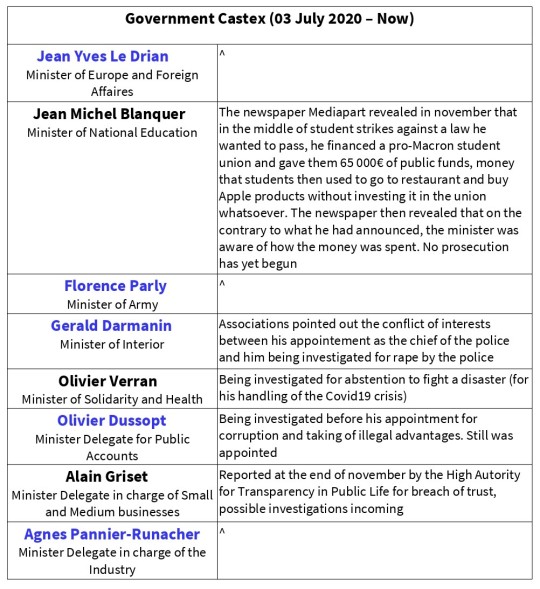
(All my sources are from french newspapers, I can give them if you ask me but I’m not gonna put them here because there are way too many)
People who had to quit the first government were still appointed deputy governor of the Bank of France (Sylvie Goulard), president of the national assembly (Richard Ferrand) and chief of foreign affaires commission at the national assembly (Marielle de Sarnez). They are being investigated for corruption and embezzlement and they still have a successfull political career, and more important they still heavily influence the laws of our country and of Europe. Sylvie Goulard was even chosen by Macron to seat at the European Commission but european deputies decided it was fucked up and rejected her appointment (F).

In this list I only talked about members of the government but there has been other scandals linked to people around Macron.
Benalla cases: It all began when we discovered Alexandre Benalla, chief of security and travels for the president, was participating in demonstration as a policeman (which he wasn’t) and used his position to beat up protestors and passerby. The rest of the case is filled with destruction and hiding of evidences(F), illegal sharing of public surveillance videotapes by the police, undeclared guns(F), illegal but unpunished use of data by the police(F) and the Elysée(F), breaking of the judiciary control by Benalla, illegal diplomatic passports and meeting with african’s leaders, russian contracts with an alleged mafia boss(F), office searchs for a newspaper ordered by the State, who tried to seize the proofs and the sources the newspaper had on the case(F) and so on. The case involves several members of the government and members of special forces, and some journalists who were writing on it were then auditionned for disclosure of state secret(F). The case in general highlighted the impunity members of the government and police officers have, as well as anyone who is close to the president, but also the dysfunction in the justice system and the impossibility for high ranked people to face justice. The fucker is still free, taunt people on twitter and still gives interviews to national television.
Kohler case: Alexis Kohler, general secretary of the Elysee and Macron right hand man during his campain, hid his personnal links to the sea transporters MSC and then attributed them huge state funds. He also lied in his involvement in the decision. We discovered Macron sent a letter to the national financial prosecutor's office to clear him, which they did, until an anti-corruption association relaunched legal proceedings. The guy is now being prosecuted for corruption and bribery. (F) (F)
Conclusion
Fuck the police, eat the rich, let’s forbid them from being elected, a next long post on the Law on Global Security the governement is trying to pass is gonna come soon if you’re interested.
Please tell me if you see any inconsistency in this post, I tried to source it as much as I could and to verify everything I wrote but like anyone else I have bias and sometimes I wrote things at 5am so I’m aware I might be incorrect and I’m open to constructive criticism. Also sorry for my approximate english sometimes.
#France#Macron#up the baguette#yellow vest#what the france#french government#french politics#french side of tumblr
59 notes
·
View notes
Text
Coffee talk with Nigerian visual artist Anthonia Chinasa Nneji

“The complexity of Nature inspires my art. The beauty of the ‘African being’ inspires my art.” That’s how Anthonia Nneji describes her practice. “I pay attention to the trauma of the female body with which I struggle with and which I embrace in my paintings. I speak of struggles with menstrual cycles, weight, insomnia, depression and the agony of discovering meaningful diagnosis in the collapsed healthcare system in Nigeria.”
This piqued my interest, so I proceeded to contact the University of Lagos graduate, who styles herself as Wallace Ejoh's protégé. She happened to be in London at the time, so we met for a cup of coffee and I asked her the topics I'd been thinking about.

1. How do you make sure you have time to create? Do you have a set time or build it into your calendar? Well...its a full time job and I work according to mood.
2. What's your tip or best way you maintain a live/work balance? Do you struggle with it? When do you know you're lacking balance? I Currently struggle with my live/work balance. And I know I'm lacking balance when I stay indoor to paint for more than 2 days, without being out for my daily walks.
3. Has there been a specific time that you recall not having your voice heard? Yes. During one of my visits to the doctor. My body was feeling some type of way. But he kept insisting my body wasn't feeling some type of way.
4. Do you have a network of other artists you rely on - and what do you do to support each other? I'm a less sociable person, I really don't have artists I rely on.

5. Do you have long-term goals? Are they written down or how do you revisit them and make sure you are moving along that path? i have long term goals, written down as well. I always work towards achieving them. When accomplished, I tick them on my list and give myself a treat for a job well done.
6. What's your biggest barrier to being an artist? How do you address it? Being told that art is not a real job and access to art supplies are my biggest barriers. There is little or nothing to be done because of the type of society I live and work in. For the art materials, I order from the US or UK sometimes and it still comes with the report of being delayed or some items stolen.
7. Who do you partner with to achieve your goals? Is it a formal network/agreement or fluid/organic? I have a gallery representation and it is a form agreement.
8. Have you ever said 'no' to an opportunity? How did you decide to say no? Yes I have. I did because it didn't serve my interest or humanity's.
9. What's your relationship with money? Have you made long-term financial plans? Yes, i have made long term financial plans.

10. How do you determine what to charge for your art or services? The demand, often gives us an idea of what to charge.
11. Do you advocate for a living wage and fair pay for your art/services? Not really.
12. How did you set your current rates? The demand gives us an idea. Then, the gallery management and I hold a meeting to discuss it.
13. How do you cultivate your audience? I really have to rule for this, I guess it just happens.
14. When do you talk about your art? Everytime. My art is a reflection of my life.
15. Do you feel that your art community challenges existing barriers and assumptions? Yes.
16. Is there something you do today that you wished you had known to do years ago? Maybe, started painting earlier.

17. Are your goals driving you towards money and fame? Yes.
18. What does generosity mean to you as an artist? How do you emulate this? It means guiding younger artists and my fellow Contemporaries.

It was really nice discussing with you Anthonia. Good luck in all your future endeavours. I’m rooting for you and look forward to seeing you on the big stage.


References
Writer, F. (2018). Anthonia Nneji: Painting Her Way To History. [online] Tush Magazine. Available at: https://tushmagazine.com.ng/anthonia-nneji-painting-way-history/.
Spark, T. (2018). Painting by Anthonia. [online] The Spark. Available at: https://www.thesparkng.com/hub/painting-by-anthonia/
Vanguard News. (2017). ALERT! Female Visual Artists on the rise. [online] Available at: https://www.vanguardngr.com/2017/12/alert-female-visual-artists-rise/
1 note
·
View note
Text
Better innovation in whatdigital
Our foundations return to a level over a Cafe in Slough, England in 2003 where Alexander Paterson originally instituted bringing high road enlistment on the web. His first item was what digital, a pursuit of employment aggregator that offered an entry for enrollment consultancies in the United Kingdom to publicize their positions. Following quite a while of developing what digital Alexander chose he required a rebrand and in May 2011 changed the item.

In 2016 Paterson acknowledged a proposition from Shane McGourty to drop the AdView name and take the item abroad to construct a brand for the meager few, however for the many. Over the course of the following 3 years Paterson and McGourty cooperated to fabricate a standing among their companions while likewise laying the foundation to dispatch in the United States of America.
During the time of 2017 Paterson and McGourty began to recognize themselves to different pioneers in their industry with the end goal of making sure about ability that could assist them with conveying their vision. This was the year when AdView dispatched their worldwide distributer program which turned into the jealousy of the online enrollment industry.
In 2018 Shane acquainted Alex with Adil Rehman who was around then, the Managing Director of what digital, a work board who were effectively exchanging 110 nations and a significant part in the DACH district of Europe. Subsequent to traveling to Asia, Paterson offered his vision to Rehman and requested him to join the board from chiefs.

In 2019 Adil presented Sudhakar Gunaseelan as " the most capable computer programmer he ever met". Sudi (as he gets a kick out of the chance to be called) was then offered the job of COO and joined the group in April 2019.
In 2020 things began to change for What Digital. With a significant pandemic and confined developments the board concurred that instead of sit and stand by, they will push their arrangements forward with expanded scurry. Inside the space of months AdView was rebranded as WhatJobs. With the new system set up Shane McGourty effectively dispatched in 31 nations, covering each landmass and along these lines started the development of WhatJobs as a worldwide brand.
In the exact year What Digital bought a news entryway and a Spanish contender covering the LATAM nations. In addition, Adil Rehman and Sudhakar Gunaseelan opened another Digital Center of greatness in Asia and set about enrolling 50 new colleagues to start the main period of the organization mission.

Today, even with quick change to any semblance of which the world has at no other time seen, our main goal is more significant than it actually has been. Our items and administrations are currently advancing quicker while additionally making them more open to individuals from varying backgrounds, in each country across the world. Any reasonable person would agree that 'The Sun Never Sets on What Digital'.
Our underlying foundations return to a level over a Cafe in Slough, England in 2003 where Alexander Paterson initially instituted bringing high road enrollment on the web. His first item was Check4Jobs.com, a pursuit of employment aggregator that offered an entryway for enrollment consultancies in the United Kingdom to publicize their positions.
We will keep on making strong strides to convey the absolute best items we can to our clients. Working in more than 50 nations we make an incentive through development and offering unmatched admittance to all. It is the What Digital way.

The WhatJobs web crawler upon demand creeps and lists live profession postings straightforwardly from bosses sites, enrollment consultancies and occupation sheets.
Contingent upon the geological area every site can list up to 10 million positions, for example, the USA. This enormous assortment of worldwide occupation advertisements has permitted the business to create huge informational collections to produce media inclusion for work and joblessness the same during the Corona-19 pandemic.
In September 2020 WhatJobs working with Google for Jobs dispatched in 7 creating African nations, Ghana, Nigeria, Kenya, South Africa, Tanzania and Uganda to help the neighborhood occupations market.
1 note
·
View note
Text
Olu Maintain replies to controversy bordering 11 years of ages tune Yahooze ▷ Nigeria headlines|Legit.ng

Commonly, performers release tracks along with the intent of passion around a notification to their enthusiasts as well as fans. While the specific notification of the tune is actually normally received at times, it can additionally be actually subject to various opposing interpretations.One of such tracks that have actually been typically
translated in various means is actually Olu Maintain's Yahooze. This song discharged 11 years ago referred to how to unwind after creating a success in one's picked endeavour.The track made a lot of appeal during its own opportunity yet it also obtained very a number of unfavorable function and customer reviews. This was actually because some individuals thought that the song promoted internet scams or even what is now called Yahoo Yahoo.Owing to the label of the song and the verses which talked a lot about alcohol, funds as well as enjoying yourself, the track has actually been taken to be actually a glorification of those that got their funds via uncertain means.While this interpretation of the song has been held on to for over 11 years, Olu Maintain, the troubadour responsible for it, has actually finally made a decision to speak up. In an interview along with Hit, the performer resisted this point of view concerning the song and also happened to give the rightful meaning of it.According to Olu Maintain, the tune in fact spoke about a youthful guy that only attacked a one million dollar bargain. It also referred to just how the person and his friends took place to commemorate his success."When you create a physical body of craft, folks may misinterpret it the means they choose.
I imply, Yahooze is 11 years of ages and if you enjoy the online video of the tune, it was focused around an approaching artist that obtained a million dollar record deal. That was the message I offered along with the song. Carries out the video whatsoever
work with World wide web scams? The answer is no."Considering on the several various other analyses that had actually been actually offered to the song, Olu Maintain said that he could possibly not regulate exactly how folks interpreted a tune so he was not definitely troubled concerning the false viewpoints folks have regarding the song.Read his phrases below:"I may certainly not be accountable for just how individuals
analyze a masterpiece. It resembles an art work, a male would value an art work for millions of dollars however to the other guy, it carries out certainly not make good sense. Art must be subjected to every person's interpretation. My interpretation of that type of fine art was actually made very apparent."Referring to why he has certainly not released any smash hit track considering that Yahooze, the vocalist opened and also clearly pointed out that taking on the here and now generation was actually not a simple job to complete. According to him, the time in which his merely hit music was discharged is way different coming from that of this particular age which motivated social media and a tough competition.His phrases listed below claims this much:"It is a various age group and a different period
along with a different human ecology. As an artiste; as you grow, your core population studies changes.Yahooze appeared in an era when there was no social networking sites. Today, individuals's determination to assimilate any sort of component is very quick; 11 years ago, it was actually not like that. If you had a favorite song, it could possibly last for regarding two years but in today times you are competing along with many body systems of job as well as it would certainly take one thing unique for you to have the exact same sort of buzz that
a tune like Yahooze had." Meantime, yet another pro named Terry G recently exposed particulars concerning his lovemaking and music.
He made known that although his baby mother loves him, she performs not like his style or even style of songs. Quite a revelation!Great Headlines! NAIJ.com( naija.ng)-> Legit.ng We have actually upgraded to offer you far better Best 10 Ideal Performances Coming From Felabration 2018( Falz, Timaya and also Slimcase )| Legit TELEVISION
This content was originally published here.
1 note
·
View note
Text
Developments of Digital Media
In my previous post, I defined Digital media and I talked about the challenges of Digital Media, using Social Media as a case study. I gave my opinion on how social Media has affected our lives, negatively. Today I am going to give my positive opinion on how Digital Media has affected our lives, and how it has developed over the years.

First of all, Digital Media has helped companies and businesses grow. Back in Nigeria, I and my sister used to own a hair salon. We weren’t getting lots of walk-ins as expected. At first, I thought we were very bad at our job, lol, until one day, we decided to take pictures of our work and post on our whatsapp status. Guess what happened next? Our friends commented and reposted our pictures, with our contact informations. Suddenly, we started getting calls from people to take their bookings.Social Media really turned our Business around, guys! There are other businesses out there that have their stories to tell, people no longer use type writers, you don’t have to pay for office space because you can work remotely, you can advertise your business online, and so on.

Secondly, Digital Media has helped me connect to my friends and family from different parts of the world. I have been away from my home country (Nigeria) for the past 6 months. I may not get to see my family and friends face to face, but Social media has helped me to keep in touch with my loved ones. I do not feel left out with whats going on at home. It has for sure, given me a home, away from home!

Lastly, Digital Media has helped me with my Academics and Education. The Pandemic couldn’t stop us from attending classes, instead we had our classes virtually, who would have thought that something like that could happen, 20 years ago? Taking classes online? lol. With the help of our Moodle where information can be passed from lecturers to students, to using the Zoom app where classes were being taken, to creating a whatsapp group where information can also be passed among students, or sending direct message to your class mate, when you need their help! At some point, I didn’t see any need to go back to our classes to have face to face learning, lol. All these, happened with the help and development of Digital Media. If the Pandemic didn’t stop us, then nothing else can stop us, that’s how global, the World has become and I’m proud and happy to be in this Digital Media era. I still can’t understand how our ancestors survived without Digital Media..lol.
Therefore, with the development of Digital Media, over the years, It has turned the world to a global village. It has made life easier for you and for me and we look forward to more developments because Growth, they say, is Constant!
For more readings go to: Pew Research Centre on https://www.pewresearch.org/internet/2018/07/03/fifty-fifty-anecdotes-how-digital-life-has-been-both-positive-and-negative/ (Accessed on the 9/10/2021)
0 notes
Text
How hundreds of Yemenis fleeing war ended up on a resort island in South Korea
By Brian Murphy, Washington Post, June 22, 2018
JEJU, South Korea--This is the end of the line for hundreds of Yemeni refugees fleeing war 5,000 miles away.
The setting is a new one in a world of migrants and asylum seekers on the move: a resort island off South Korea’s southern coast where tourists come to dive the reefs, golf and eat local seafood specialties.
But the wider story unfolding on Jeju Island is familiar. It is about desperate people looking for any loopholes or undiscovered pathways on the migrant trails crisscrossing the globe, seeking a place willing to take them in.
It is how Africans have shown up on the U.S.-Mexico border after an overland trek from Brazil, how Syrians came ashore on Greek beaches in 2015 and how Iranians are among those in holding camps on the Pacific island nation of Nauru. And how South Korea is now thrust into a refugee quandary that caught it by surprise.
Jeju’s improbable turn began in early spring.
Word was out already of Jeju’s tourist-friendly visa policies, making it one of the few places that did not require advance visas for Yemenis. A few Yemenis reached Jeju in recent years to make claims for refugee status in South Korea.
What changed this year was a new direct flight to Jeju on a budget airline from Kuala Lumpur in Malaysia, which also grants Yemenis a visa on arrival. At first, a trickle of Yemenis arrived in Jeju. Then many more--all willing to risk sometimes all their savings to flee more than four years of warfare and deepening humanitarian miseries.
The hope was that Jeju would be a springboard to reach Seoul and apply for refugee protections. But that proved wrong. South Korean officials quickly blocked Yemenis from leaving the island, and on June 1, Jeju dropped Yemen from the no-visa rules to join a handful of other countries including Syria, Iran and Nigeria.
The more than 500 Yemenis who made it to Jeju before the door closed--mostly men, but some families with children--are stranded. They can’t reach the mainland, and few have the money or inclination to return to Malaysia.
“We are not wanted anywhere,” said Ahmed Abdu, 23, who left Ibb in central Yemen in April on a more than $2,000 trip that transited through Jordan and Qatar, then to Kuala Lumpur and on to Jeju. “America doesn’t want us. Europe doesn’t want us. Saudi Arabia doesn’t want us. When we heard about Jeju, we thought, ‘Maybe this is a place that can save us.’”
He paused to think about what he just said. “We can’t leave. That is true,” he added. “But we are alive. We are not worrying about war. That is something very good.”
Abdu, like many Yemenis in rebel-held territory, was caught between both sides. His neighborhood was blasted by waves of Saudi-led airstrikes--using U.S.-made warplanes and weaponry--against rebel fighters, known as the Houthi, controlling most of northern Yemen. Riyadh and its allies claim the Houthi receive direct support from Iran, something Tehran officials deny. Abdu did not want to talk about how many relatives and friends had been killed. “Many,” he said.
The tipping point came after Houthi forces tried to forcibly conscript young men in his area, he said. “I knew there was no way I could remain.”
Yemen continues to sink deeper into chaos. A push by Saudi-led forces to claim the port of Hodeida, a critical entry point for fuel, medicine and other supplies, has touched off another civilian exodus, and international aid groups warn that an all-out fight for the city could be another staggering blow to the country.
At first, Abdu and the other Yemenis arriving in Jeju, which has a population of about 600,000, were left to fend for themselves. They piled into hostels, cheap hotels and campgrounds, getting an occasional meal from a restaurant or volunteers.
Slowly, some help has taken shape.
On Monday, more than 200 Yemenis received free health screenings by the Korean Red Cross and lined up for jobs arranged by Jeju officials while their refugee status was being assessed, which could take months or longer. Some took tough work that Koreans do not want--on fishing boats or fish farms making the legal minimum wage of about $1,500 a month. The luckier ones found jobs in restaurant kitchens. A local migrant aid society--normally dealing with Filipinos and other Asians--started Korean language classes for Yemenis.
But the Yemenis in Jeju have opened a difficult conversation in a nation where only a small fraction of refugees have been approved to stay since the 1990s. Last year, South Korea finished review for 6,015 refugee claims, rejecting all but 91 of them, according to South Korea’s Justice Ministry. Eleven of the Yemenis who passed through Jeju in earlier years were among those granted refugee status.
“About 500 people from Yemen may not seem like a lot for countries that have dealt with hundreds of thousands, even millions, of refugees and people fleeing war,” said Lee Il, a rights attorney with Seoul-based Advocates for Public Interest Law. “Here, it has forced people to think about the wider world of suffering and, in a rich country, how we fit in.”
On May 31, the Yemeni arrivals sparked perhaps the first anti-immigrant march in Jeju. In Seoul, an online petition calling for South Korea to pause allowing any more refugees cleared 200,000 shows of support Monday on the presidential Blue House website--meaning the government must issue a response within 30 days.
Kim Eui-keum, a spokesman for South Korea’s presidential office, added Wednesday that police patrols on Jeju will be stepped up to “avoid unnecessary clashes or interference.”
Jeju’s governor, Won Hee-ryong, told a meeting Monday that he believes authorities and private businesses should band together to help the Yemenis.
“Jeju can set an example for the first refugee crisis our country is facing,” he said.
Still, resources are thin. There was only one immigration investigator on Jeju to hear refugee cases when the Yemenis began to arrive. Just two people on the island spoke Arabic. On Monday, one of them led translation for a crash seminar on South Korean culture for about 100 Yemenis, all men.
“I thought I’d be in Jeju maybe two weeks and then head onto Seoul,” said Gamdan, a 36-year-old from Yemen’s capital, Sanna, who arrived in Jeju in May. “It was a big surprise when I learned that I wasn’t going anywhere.”
Gamdan, who gave only his first name, serves as an Arabic-English translator for the increasing number of groups on Jeju who need it.
“Here,” said Sister Christina Gal, part of a Roman Catholic aid service, Naomi. She handed a cellphone to Gamdan.
“Tell her that we found her a house to live in,” she said.
Gamdan told the Yemeni woman on the phone the good news--someone in Jeju had offered her a place to stay for at least a month.
In the other room, a South Korean volunteer quizzed Yunes Melhi Naji, a 27-year-old waiting for a free dental check for an aching molar. The volunteer, who knew almost nothing of Ramadan, wanted to know more about the Muslim dawn-to-dusk month of fasting that just ended.
“But you must drink water during the day?” asked the woman in English.
“Nothing,” answered Naji.
“But no water ever?”
“No, ma’am,” he said. “The Ramadan fast is no problem. What is a problem is being here without work and not knowing what will happen.”
4 notes
·
View notes
Text
Nigeria Football World Cup: Former Stuttgart star says Rohr will lead Nigeria to Qatar Football World Cup 2022
The German mediator will be hopeful to lead the three-time African winners to a fourth successive main competition when the qualifiers kick off next month. Previous Nigerian protestor Jonathan Akpoborie says he’s hopeful Super Eagles trainer Garnet Rohr will qualify Nigeria for the Qatar Football World Cup 2022.
Fans from all over the world are called to book Football world Cup tickets from our online platforms WorldWideTicketsandHospitality.com. Football World Cup fans can book Nigeria Football World Cup Tickets on our website at exclusively discounted prices.

The Super Eagles, who qualified for next year’s Africa Cup of Nations undefeated have been rutted alongside Liberia, Cape Verde, and Central Africa Republic (CAR) in the second round of the CAF World Cup 2022 qualifiers. Nigeria’s first game, coming up in June this year, will be alongside the Lone Stars of Liberia, who stretched this phase after pushing neighbors Sierra Leone in the first round.
The three-time African Champions are favorites as none of their enemies have played at the FIFA World cup 2022. In an interview with Soccernet.ng, the former Wolfsburg protestor specified that the squad has what it receipts to qualify for the Mundial. He famous that Rohr has built a squad capable of thrashing any team in his group and imagines the German strategist to select the correct players for any game.
I think the Super Eagles to qualify for the Qatar Football World Cup 2022 successful by the capability of players in Garnet Rohr’s disposal. Despite being grouped beside Liberia, Cape Verde, and Central Africa Republic (CAR), I actually don’t see the squad stressed to qualify. This squad will get the job spotless and smooth.

Yes there no minnows in football, however I know the squad has what it receipts to confusion some of the teams in our group. The final round will only be the greatest problematic but I still trust our boys will get the job done. Since creation their debut in the quadrennial competition in USA 1994, Nigeria have only unsuccessful once to qualify for the competition in 2006.
The three-time African champions were reduced at the group stage of the 2018 edition in Russia after securing only three points from three games following a win against Iceland and losses to Croatia and Argentina. The West Africans’ best visits in the struggle were in 1994, 1998, and 2014 where they grasped the Round of 16.
We are offering tickets for Qatar Football World Cup 2022. Football Admirers can get Qatar Football World Cup 2022 Tickets through our trusted online ticketing marketplace. Worldwideticketsandhospitality.com is the most reliable source to book Qatar Football World Cup Hospitality tickets.
#QatarFootballWorldCup#QatarFootballWorldCupAndHospitalityTickets#NigeriaFootballWorldCupTickets#FIFAWorldCup2022Tickets#FootballWorldCup2022HospitalityPackages
0 notes
Text
IPOB/MASSOB Members’ Asylum: FG May Summon British Envoy
New Post has been published on https://thebiafrastar.com/ipob-massob-members-asylum-fg-may-summon-british-envoy/
IPOB/MASSOB Members’ Asylum: FG May Summon British Envoy

The Federal Government on Tuesday communicated outrage regarding an arrangement by the United Kingdom to offer refuge to “mistreated” individuals from the Indigenous People of Biafra and the Movement for the Actualisation of the Sovereign State of Biafra.
(adsbygoogle = window.adsbygoogle || []).push();
The Minister of Information and Culture, Alhaji Lai Mohammed, in a meeting with the News Agency of Nigeria in Abuja, said the arrangement was insolent to Nigeria as a country.
Mohammed expressed this as there were signs on Tuesday that the Federal Government may bring the British High Commissioner to Nigeria, Catriona Laing, over the haven offer.
In any case, socio-political gatherings including the Middle Belt Forum, the Ohanaeze Ndigbo, Afenifere and the Pan-Niger Delta Forum, upheld the refuge offer by the UK and castigated the Federal Government over the turn of events.
The UK Visas and Immigration gave new rules to its chiefs on the most proficient method to consider and give refuge utilizations of individuals from Biafran secessionist bunches in Nigeria.
(adsbygoogle = window.adsbygoogle || []).push();
In the rules distributed on assets.publishing.service.gov.uk/government, it expressed that the haven would be conceded to “oppressed” individuals from IPOB and MASSOB.
The Federal Government a couple of years prior assigned IPOB, which was shaped in 2012 by Nnamdi Kanu, as a fear monger association. MASSOB was established in 1999 by Ralph Uwazuruike.
The two gatherings are requiring the severance of the Igbo in the South-East and numerous other ethnic identities in the South-South from Nigeria.
In the rules named, ‘Nation Policy and Information Note Nigeria: Biafran secessionist gatherings,’ delivered in March, the UKVI, a division of the Home Office, guided its chiefs to consider if an individual “who effectively and straightforwardly upholds IPOB is probably going to be in danger of capture and confinement, and abuse which is probably going to add up to oppression.”
(adsbygoogle = window.adsbygoogle || []).push();
It further said the UK should likewise consider if the Federal Government’s activities were demonstrations of indictment, not oppression.
“Those escaping arraignment or discipline for a criminal offense are not ordinarily outcasts. Arraignment may, be that as it may, sum to mistreatment in the event that it includes exploitation in its application by the specialists,” the 56-page record noted.
An illustration of mistreatment, the UKVI said was “on the off chance that it is the vehicle or pardon for or if just certain gatherings are arraigned for a specific offense and the results of that segregation are adequately extreme. Discipline which is barbarous, brutal or debasing (counting discipline which is messed up with regards to the offense submitted) may likewise add up to abuse.”
On the supposed underestimation of the Igbo, which it said prompted the current fomentation by IPOB, it said, ”Nigeria’s President Muhammadu Buhari has been seen by some as being contemptuous and unsympathetic towards individuals of the South-East, especially as to the arrangement of senior government authorities which seemed to support his northern constituents.
(adsbygoogle = window.adsbygoogle || []).push();
“Some Igbo whine of under-portrayal in the Federal Government, minimization, inadequate foundation because of a more modest allotment of administrative assets than different locales, and a feeling of recorded complaint against an express that they say doesn’t address them.”
The UK government saw that new freedom developments were, ”allegedly determined by a feeling of uncalled for treatment and minimization.”
It revealed that MASSOB and IPOB had to a great extent upheld tranquil change yet on events had utilized way of talking that may support vicious obstruction, adding that IPOB specifically, through its online stage, Radio Biafra, and online remarks of its chief, Kanu, had stirred up secessionist goals and urged protection from the specialists.
(adsbygoogle = window.adsbygoogle || []).push();
The rules noticed that however MASSOB was not a prohibited association and kept on directing public exercises, some of its allies had been captured – and some slaughtered during exhibitions.
It expressed, ”MASSOB, since its arrangement in the last part of the 1990s, has conflicted with the security powers. Various individuals have been murdered, injured and captured – ordinarily during exhibits. Over 100 captures were made in September 2018, at any rate 10 of every 2019; and, in July 2020, it was accounted for that individuals from MASSOB were captured following conflicts with the police.
“IPOB has lately become the prevailing Biafran bunch. Since 2015, the security powers have apparently extra-judicially executed tens and harmed many its allies and initiative, frequently utilizing inordinate power to control fights.
“The security powers have likewise captured many IPOB allies at various occasions, generally while disturbing exhibits or walks to advance Biafran freedom, especially during 2015 to 2017, just as during attacks on the homes of IPOB pioneers. Sources likewise report conflicts with the specialists during 2018 and Amnesty announced that security powers captured at any rate 200 and killed 10 allies at various occasions during 2019.
(adsbygoogle = window.adsbygoogle || []).push();
“Further conflicts and viciousness happened between security powers and IPOB in August 2020 in the city of Enugu when the police raged an IPOB meeting and furthermore in October 2020 during showdowns in Rivers State. These episodes brought about the captures and passings of IPOB allies also security power faculty, in spite of the fact that there appear to be conflicting covering the specific figures.”
The UKVI likewise alluded to reports demonstrating that some IPOB individuals, allies and pioneers captured had been accused of treachery which is culpable with capital punishment.
On cases for thought for shelter, the UK organization said, “A danger of oppression will rely upon their job, profile and exercises for the gathering, and past captures by the state. An individual who effectively and transparently upholds IPOB is probably going to be in danger of capture and confinement, and abuse which is probably going to add up to mistreatment. Each case should be painstakingly thought to be on its realities, with the onus on the candidates to show that they are probably going to confront a danger of abuse.”
(adsbygoogle = window.adsbygoogle || []).push();
While recognizing examples of assaults on security powers by IPOB individuals, the organization said where individuals from MASSOB or IPOB had affected or utilized brutality to upset public request, the public authority may have genuine grounds to capture and arraign those individuals.
It, nonetheless, contended that “where the public authority has captured and kept people who, for instance, calmly take an interest in exhibitions and has then accused them of treachery or the individual is exposed to times of detainment in corrupting or cruel conditions, such treatment is probably not going to be reasonable or proportionate, and is probably going to add up to mistreatment.”
(adsbygoogle = window.adsbygoogle || []).push();
A senior authority of the Federal Government, who trusted in one of our reporters, expressed that the public authority would request a clarification from the UK on its choice which Nigeria considered as improper and a hidden help for the prohibited gathering which had been upsetting for the deterioration of the country.
The source expressed, “The Ministry of Foreign Affairs will take up the refuge offer to IPOB with the British High Commission. The public authority may bring the High Commissioner and request a clarification for their choice which is absolutely improper and a type of help for the banished bunch.”
0 notes
Photo

Top 10 Smartest Ways to Make Money Online in Nigeria.
What are the smartest ways to make money online in Nigeria? At present, it’s a common question in Nigeria. People in the virtual world are familiar with the words ‘cash back’, cash reward, customer reward, etc. when it comes to buying and selling products or services or earning from various websites. Towards the end of the last century, some companies in the United States and Europe adopted cashback as a strategy to create new product demand and expand their business. Many websites now offer this type of job from which you can earn without having a full-time job. In Africa, too, the impact has spread rapidly, with a lack of jobs contributing to Nigeria’s unemployment rate of 23.1% by the end of 2018. It was about a quarter of the population without jobs!
https://alldiscounts.ng/make-money-online-in-nigeria/
0 notes
Text
Wednesday, March 3, 2021
COVID-19 pandemic fuels attacks on health workers globally (AP) Two Nigerian nurses were attacked by the family of a deceased COVID-19 patient. One nurse had her hair ripped out and suffered a fracture. The second was beaten into a coma. Following the assaults, nurses at Federal Medical Centre in the Southwestern city of Owo stopped treating patients, demanding the hospital improve security. Almost two weeks passed before they returned to work with armed guards posted around the clock. The attack in Nigeria early last month was just one of many on health workers globally during the COVID-19 pandemic. A new report by the Geneva-based Insecurity Insight and the University of California, Berkeley’s Human Rights Center identified more than 1,100 threats or acts of violence against health care workers and facilities last year. Researchers found that about 400 of those attacks were related to COVID-19, many motivated by fear or frustration, underscoring the dangers surrounding health care workers at a time when they are needed most. “Our jobs in the emergency department and in hospitals have gotten exponentially more stressful and harder, and that’s at baseline even when people are super supportive,” said Rohini Haar, an emergency physician in Oakland, California, and Human Rights Center research fellow. “To do that work and to do it with commitment while being attacked or with the fear of being attacked is heartbreaking to me.”
Millions couldn’t afford diapers before the pandemic. Now, diaper banks can’t keep up. (Washington Post) Chelesa Presley is deeply familiar with the struggles of young families, first from her years as a social worker and now from running a nonprofit in one of Mississippi’s poorest regions. She’s used to the questions about car seats, nursing and colicky babies, but paying for diapers is always the chronic and most-pressing worry. “I see parents not putting anything on their babies because they don’t have diapers,” she said. “I’ve seen people use shopping bags with some rags in it. I’ve seen T-shirts. I’ve seen people keeping the diapers on longer than necessary, and the diapers sag down when the babies walk.” As founder and executive director of Diaper Bank of the Delta, Presley is part of a grass-roots support network at the forefront of a crisis: Requests have doubled, tripled and even quadrupled at some locations, social services workers say, with diaper shortages and families lining up for hours in some communities. Meanwhile, the cash and in-kind donations that keep diaper banks afloat have slumped, and their mostly volunteer workforce has shriveled since the pandemic. Diaper need is an often-overlooked measure of Americans’ economic reversals, said Joanne Samuel Goldblum, chief executive and founder of the National Diaper Bank Network. There are so many people “who do not have enough money to meet their basic needs, and what we’ve found is that diaper need is a window into poverty.”
Biden retreats from vow to make pariah of Saudis (AP) As a presidential candidate, Joe Biden promised to make a pariah out of Saudi Arabia over the 2018 killing of dissident Saudi writer Jamal Khashoggi. But when it came time to actually punish Saudi Arabia’s crown prince, America’s strategic interests prevailed. The Biden administration made clear Friday it would forgo sanctions or any other major penalty against Saudi Crown Prince Mohammed bin Salman in the Khashoggi killing, even after a U.S. intelligence report concluded the prince ordered the hit. The decision highlights how the real-time decisions of diplomacy often collide with the righteousness of the moral high ground. And nowhere is this conundrum more stark than in the United States’ complicated relationship with Saudi Arabia—the world’s oil giant, a U.S. arms customer and a counterbalance to Iran in the Middle East. Ultimately, Biden administration officials said, U.S. interests in maintaining relations with Saudi Arabia forbid making a pariah of a young prince who may go on to rule the kingdom for decades. That stands in stark contrast to Biden’s campaign promise to make the kingdom “pay the price” for human rights abuses and “make them in fact the pariah that they are.”
Heavy rains lead to rescues, road closures in Appalachia (AP) Kentucky firefighter Eddie Stacy was turning his firetruck around in the dark while responding to storm damage when he noticed a tiny light coming from the flooded Red River. A woman was sitting on a stalled car’s door window, waving her cellphone flashlight and yelling for help. “Nobody could hear from where she was,” Stacy said. “That little flashlight when I was driving down the road just caught my attention. It was God, I tell you. It was God to have me in that place where I was supposed to be.” Heavy thunderstorms pounded parts of Appalachia on Sunday and Monday, sending rivers out of their banks and leading to multiple water rescues, mudslides, road closures and power outages, officials said. Kentucky Gov. Andy Beshear declared a state of emergency Monday because of heavy rainfall across the state.
In Mexico, those accidents waiting to happen (Worldcrunch) For drivers in Mexico, the rule of thumb for traffic accidents is simple: el que pega, paga! In other words, the perpetrator of a crash—i.e. the incoming vehicle—pays. In a country where many are uninsured, that kind of unspoken understanding makes sense. But the pega-paga approach has also created an opportunity for scammers to pocket some ill-gained pesos through a practice known as montachoques or chocachoca, the operative word being choque, Spanish for “crash.” An extortion technique being used increasingly in Mexico City, it involves provoking an accident by halting a car on a busy highway, then demanding compensation from the person who crashed in from behind. When victims are reluctant to pay, they are threatened and sometimes even attacked, a senior police official in the eastern sector of the city recently told the Milenio newspaper. The official, Luis Martínez Rodríguez, described a typical maneuver as overtaking a car, then suddenly slamming the breaks to provoke a crash. The “injured party” then steps out, sometimes with companions, and demands compensation, with sums ranging from the equivalent of around $70 euros to $1,500. Two or even three cars may be involved to ensure the victim is trapped into the situation.
Amid scramble for COVID-19 vaccine, Latin America turns to Russia (Reuters) As Bolivia struggled late last year to secure deals with large drug firms to supply COVID-19 vaccines, the incoming president, Luis Arce, turned to Russia for help. By the end of December, Bolivia clinched its first major COVID-19 vaccine deal, with enough shots for some 20% of the population. The first Sputnik V doses arrived in the country in late January, just as virus cases were spiking. “It was a really marathon task,” said Bolivian trade minister Benjamin Blanco of the procurement quest, but Russia’s political will made it possible. Western vaccine makers “told us developing countries that we had to wait until June.” He didn’t name names. Bolivia’s reliance on Moscow underscores how governments across the region have turned to Russia’s Sputnik V drug amid fears of being left behind in the global scramble for vaccines. As many wealthier developed nations have signed big deals with large drugmakers like Pfizer Inc and AstraZeneca PLC, countries in Latin America have faced difficulties securing adequate vaccine supplies.
Pandemic Pushes Brazilian Hospitals to Breaking Point (Reuters) Coronavirus deaths are now at an all-time high in Brazil, averaging 1,208 per day over the past week. New cases have also peaked, averaging roughly 54,000 per day over the last seven days. The increases are pushing medical resources to the limit. Intensive care units in 17 of Brazil’s 26 states are close to capacity, while six more are completely full, O Globo reports. Vaccine distribution, long-touted as the country’s strength, has been slow—only 3.2 percent of the country has been given a vaccine dose, according to Bloomberg.
Banks in Germany Tell Customers to Take Deposits Elsewhere (WSJ) Interest rates have been negative in Europe for years. But it took the flood of savings unleashed in the pandemic for banks finally to charge depositors in earnest. Germany’s biggest lenders, Deutsche Bank AG and Commerzbank AG, have told new customers since last year to pay a 0.5% annual rate to keep large sums of money with them. The banks say they can no longer absorb the negative interest rates the European Central Bank charges them. The more customer deposits banks have, the more they have to park with the central bank. That is creating an unusual incentive, where banks that usually want deposits as an inexpensive form of financing, are essentially telling customers to go away. Banks are even providing new online tools to help customers take their deposits elsewhere. According to price-comparison portal Verivox, 237 banks in Germany currently charge negative interest rates to private customers, up from 57 before the pandemic hit in March of last year. Charges range between 0.4% and 0.6% for deposits beginning anywhere from €25,000 to €100,000.
Gorbachev, last Soviet leader, to mark 90th birthday on Zoom (Reuters) Mikhail Gorbachev, the last Soviet leader, was expected to throw a Zoom party on Tuesday to celebrate his 90th birthday as President Vladimir Putin lauded him as an outstanding statesman who influenced the course of world history. Gorbachev, who championed arms control and democracy-oriented reforms as Soviet leader in the 1980s, is widely credited with helping end the Cold War. His critics in Russia blame him however, for what they regard as the unnecessary and painful breakup of the Soviet Union in 1991.
Afghan reconstruction (AP) A study from the Special Inspector General for Afghanistan Reconstruction reviewed the $7.8 billion spent on buildings and vehicles in the nation since 2008 and found that only $1.2 billion was used as intended, and a paltry $343.2 million worth of the buildings and vehicles remain maintained in good condition. The billions wasted include both infrastructure lost to attacks and corruption, and just kind of throwing money around without really thinking about it. Often the agencies responsible for building things did not ask if they were wanted or needed, or if they had the ability to maintain them.
Myanmar’s Military Deploys Digital Arsenal of Repression in Crackdown (NYT) During a half century of military rule, Myanmar’s totalitarian tools were crude but effective. Men in sarongs shadowed democracy activists, neighbors informed on each other and thugs brandished lead pipes. The generals, who staged a coup a month ago, are now back in charge with a far more sophisticated arsenal at their disposal: Israeli-made surveillance drones, European iPhone cracking devices and American software that can hack into computers and vacuum up their contents. In Myanmar, they are the digital weapons for an intensifying campaign in which security forces have killed at least 25 people and detained more than 1,100, including the ousted civilian leader, Daw Aung San Suu Kyi. On Monday, she was hit with new criminal charges—making a statement that could alarm the public and inducing someone to act against the state—that could put her in prison for years. Hundreds of pages of Myanmar government budgets for the last two fiscal years viewed by The New York Times show a voracious appetite for the latest in military-grade surveillance technology. The documents, provided by Justice For Myanmar, catalog tens of millions of dollars earmarked for technology that can mine phones and computers, as well as track people’s live locations and listen in to their conversations.
China Charges Ahead With a National Digital Currency (NYT) Annabelle Huang recently won a government lottery to try China’s latest economics experiment: a national digital currency. After joining the lottery through the social media app WeChat, Ms. Huang, 28, a business strategist in Shenzhen, received a digital envelope with 200 electronic Chinese yuan, or eCNY, worth around $30. To spend it, she went to a convenience store near her office and picked out some nuts and yogurt. Then she pulled up a QR code for the digital currency from inside her bank app, which the store scanned for payment. China has charged ahead with a bold effort to remake the way that government-backed money works, rolling out its own digital currency with different qualities than cash or digital deposits. The country’s central bank, which began testing eCNY last year in four cities, recently expanded those trials to bigger cities such as Beijing and Shanghai, according to government presentations. The effort is one of several by central banks around the world to try new forms of digital money that can move faster and give even the most disadvantaged people access to online financial tools.
‘Turning the knife blade inwards’ (The Economist) For many members of China’s 3 million-strong domestic-security forces, these must be deeply worrisome times. On February 27th the Communist Party announced the start of a long-expected purge of their ranks. It will involve, say officials, “turning the knife-blade inwards” to gouge out those deemed corrupt or insufficiently loyal to the party and its leader, Xi Jinping. More than eight years into Mr Xi’s iron rule, the party appears to wonder whether a vital bulwark of its power is entirely trustworthy. State-controlled media have described it as the biggest such campaign since the late 1990s within the domestic security system, which includes the police, the secret police, the judiciary and prisons. It is due to last for about a year. The aim is to ensure that these agencies are “absolutely loyal, absolutely pure and absolutely reliable.”
Nearly four in 10 university students addicted to smartphones, study finds (The Guardian) Almost four in 10 university students are addicted to their smartphones, and their habit plays havoc with their sleep, research has found. A study of 1,043 students aged 18-30 at King’s College London found that 406 (38.9%) displayed symptoms of smartphone addiction, as defined by a clinical tool devised to diagnose the problem. More than two-thirds (68.7%) of the addicts had trouble sleeping, compared with 57.1% of those who were not addicted to their device. Students who used their phone after midnight or for four or more hours a day were most likely to be at high risk of displaying addictive use of their device. Participants were judged to be addicts if they could not control how long they spent on their phone, felt distressed when they could not access their phone, or neglected other, more meaningful parts of their life because they were busy on their device.
0 notes
Text
Keep Your Eyes On These 8 Emerging Makers!
Keep Your Eyes On These 8 Emerging Makers!
Creative People
by Sally Tabart

A collection of vessels, inspired by architectural forms. Photo – Amelia Stanwix for The Design Files.

Artichoke magazine editor and passionate ceramicist Cassie Hansen in her Kyneton studio. Photo – Amelia Stanwix for The Design Files.
Cassie Hansen
Cassie Hansen took her first beginner’s pottery course just three years ago. For the last seven years Cassie has been the editor of Artichoke, an interior design and architecture magazine, where she still works a few days a week. The rest of her time she spends in her studio in Kyneton, working on refining the style of her elegant, functional vessels.
It’s easy to see the influences she’s absorbed from all those years of covering excellent architecture, elements of which she translates brilliantly to her pieces.
Revisit the original story here.

Vessels by Lucy Tolan. Photo – Shelley Horan. Art Direction + Styling by Mildred & Duck. Tiled plinths by Occasional Pieces.

Vessels by Lucy Tolan. Photo – Shelley Horan. Art Direction + Styling by Mildred & Duck. Tiled plinths by Occasional Pieces.

Vessels by Lucy Tolan. Photo – Shelley Horan. Art Direction + Styling by Mildred & Duck. Tiled plinths by Occasional Pieces.
Lucy Tolan
Newcomer Lucy Tolan went straight from high school to art school, graduating from a Bachelor of Fine Arts specialising in ceramics in 2018. Last year, Lucy launchd her professional ceramics practice (mid lockdown!).
Primarily using the techniques of slab-building and hand coiling, Lucy’s first collection Seams has since been exhibited at Craft Victoria, and is now stocked at Modern Times. We love her wonderfully wobbly designs, and can’t wait to see what she does next!
Revisit the original story here.

Dinzi Amobi left behind her law career to pursue design, and started Ulo from her kitchen table! Photo – Amelia Stanwix for The Design Files.

Dinzi uses wax fabrics to create her designs, the staple fabric of the African continent. Photo – Amelia Stanwix for The Design Files.
Ulo Australia
Although Dinzi Amobi isn’t technically a ‘new’ maker, her textiles brand Ulo Australia caught our eye for the first time in late 2020. Three years ago Dinzi quit her job as a lawyer and took a chance on Ulo Australia, the fashion and homewares business she’d been spending her nights working on from her kitchen table. Dinzi has developed a network of market stall-holders in Africa, where she sources fabrics to create her brilliant wares.
‘All of our collections are inspired by what I was surrounded by growing up in Nigeria and then London,’ Dinzi explains. ‘Whether it be home textiles or fashion, everything is motivated by the styles and shapes that filled my family home.’
Revisit the original story here.

Inside the Preston studio of ceramicist Ella Reweti. Photo – Amelia Stanwix for The Design Files.

Ella unstacking the kiln in her studio. Photo – Amelia Stanwix for The Design Files.

Ella’s soft, ridged vases and planters are her signature form! Photo – Amelia Stanwix for The Design Files.
Ella Reweti
Melbourne-based ceramicist Ella Reweti first started exploring pottery during her postgraduate studies in anthropology, making ‘wonky little pinch pots’ for her friends. When the PhD didn’t work out, Ella scored a job as a pottery assistant, and discovered her love for handcrafting pieces. Slowly but surely, she built up her skills working for other makers, but it wasn’t until she had her baby (now 15-month old, Hemi!) that she had the opportunity to really invest in her own practice.
Fast-forward to now and Ella is making some of the most coveted ceramics pieces around. She’s developed a distinct style for her planters, vases and tableware with their soft, corrugated edges. ‘This is the first time (maybe ever!) that I’ve not had to supplement my income with a job in hospitality, and that feels really good.’ Go Ella!
Revisit the original story here.

Lucas Wearne, the maker behind Neighbourhood Studio. Photo – Amelia Stanwix for The Design Files.

Lighting and sculptures made from Australian limestone, by Lucas Wearne of Neighbourhood Studio. Photo – Amelia Stanwix for The Design Files.

Neighbourhood Studio on show! Photo – Amelia Stanwix for The Design Files.
Neighbourhood Studio
Early last year we proclaimed that Lucas Wearne of Neighbourhood Studio would be the next big thing…and we weren’t wrong! Working out the back of his Thornbury home in Melbourne’s North, Lucas makes functional, sculptural objects, hand-carved from Australian natural limestone.
Working across lighting, sculpture and artwork, Lucas has developed a bit of a cult following, and his pieces are in hot demand!
Revisit the original story here.

Left: The J7 Daybed by James Howe. Photo – James Howe. Right: The J5 Cabinet by James Howe. Photo – Peter Ryle.
James Howe
Before he was an award-winning furniture maker, James Howe used to be a journalist. When he couldn’t find the kind of furniture he wanted, he went home to research online. It was then that he stumbled across the work of Danish modernist designer Børge Mogensen, whose work triggered a deep, emotional experience James couldn’t ignore. The former journalist decided to make the furniture he couldn’t find for himself, and completely change his career path!
As one of the finalists in the TDF Design Awards Emerging Designer category this year, James has clearly made his mark in this relatively new career!
Revisit the original story here.

A range of crinkly vessels from Softedge. Photo – Layla Cluer.

The ‘Ewer’ vase by Softedge. Photo – Layla Cluer.
Soft Edge Studio
Northern Rivers-based artist and ceramicist Layla Cluer initially studied architecture at university, and spent a few years working for firms in Melbourne before applying to art school. In 2019 she quit her full-time job working, spent a month crewing on a yacht from New Zealand to Tonga (as you do!), and enrolled in ceramics classes at Lismore TAFE. This windy route to handcrafted clay was the beginnings of Softedge, her fledgling practice which she now runs from a studio on her friend’s farm outside Byron Bay.
We could not be more in love with her distinctive Ewer jug, a vessel with a pot-bellied silhouette that comes in a range of different colours. Softedge is certainly one to watch!
Revisit the original story here.

Georgie Brunmayr, founder of Curio Practice. Photo – Amelia Stanwix for The Design Files.

A Curio Practice blanket in the Cherry colourway. Photo – courtesy of Curio Practice.
Curio Practice
Textile Designer Georgie Brunmayr had been dreaming of creating her own brand for years before she finally did it. After some time working in China, Georgie returned home in mid-2019, which is when the idea for her blanket brand Curio Practice first started bubbling away. When Melbourne went into lockdown earlier this year Georgie was finally able to invest the time and energy to Curio Practice a real thing.
Georgie is passionate about making special pieces that last a lifetime, and keeping the skills of the textiles industry in Australia alive. She works with a local knitting factory in Reservoir to produce her luxurious knitted blankets, which each uses around 1.9kg of high-grade Australian Merino wool sourced from farms across Victoria, New South Wales, and Western Australia.
Revisit the original story here.
0 notes
Text
#Opportunities - Art Connects Us Research Grants

Call for Expressions of Interest – April 2018
1. Introduction The British Council is aiming to increase connections between the UK creative sectors and young creative professionals in Sub-Saharan Africa. As well as building connections, we aim to expand knowledge of contemporary African art in the UK with a view to more work from Sub-Saharan Africa being seen and experienced by UK audiences. With this in mind we are seeking expressions of interest from UK based arts organisations / curators / programmers working in any of the following art forms - Visual Arts, Literature, Music, Theatre, Dance, Architecture, Design, Fashion and Film to travel to Sub-Saharan Africa and conduct research through the ‘Art Connects Us’ grants. The trips should take place between June and Dec 2018. Research may take the form of meeting with potential artists and partners; finding out more about your chosen art forms’ ecosystem in a particular country or countries; gaining an understanding of art trends in Sub-Saharan Africa; meeting arts organisations and/or attending events and festivals with a view to programming or curating work in the UK. The countries covered under the programme (in which the British Council operates) are: Botswana, Ethiopia, Ghana, Kenya, Malawi, Mauritius, Mozambique, Nigeria, Rwanda, Senegal, Sierra Leone, South Africa, South Sudan, Sudan, Tanzania, Uganda, Zambia and Zimbabwe.
2. Aims of the programme This opportunity aims to: - facilitate the UK creative sector’s ambitions to connect with young, African creatives and art professionals who are 18 to 35-year-olds; - increase opportunities for UK arts organisations and individuals to visit African cities and gain further insight into the chosen local art sector; - encourage and support the development of networks that connect the UK and Sub-Saharan African arts sectors for the long term; - widen the opportunities for art professionals in Sub-Saharan Africa to connect with UK arts organisations and arts professionals.
3. Art Connects Us Our programme aims include these three core elements: Art, audiences and innovation – sharing the best of arts and culture in Sub-Saharan Africa and the UK is at the heart of our agenda. We bring partners together to bring new art to audiences. Skills and networking – we strive to expand audiences for the arts through developing new networks and skills for our partners. Brokering and communication – we communicate the work of the creative sectors where we work, enabling artists and audiences to connect with each other. We aim to support the aims and ambitions of artists. Our work also recognises that supporting the development of cultural industries can enable more people to engage with creativity as artists and audiences and contribute to more prosperous, fulfilling and happy lives for us all. The following strands of work enable us to focus our work in areas we feel have relevance to audiences in the UK, Sub-Saharan Africa and globally: We look to improve the knowledge of the UK creative sector of contemporary African arts and increase the opportunity for UK artists and audiences to engage with young African art practitioners and their work through the partnerships we develop. Our work on festivals focuses on enabling these cultural platforms to be a convening point for artists to meet, forge new networks, share skills and connect their art directly with new audiences. Through our creative enterprise programme we look to enhance the livelihood potential for entrepreneurs, freelancers and other professionals in the creative economy. We do this by offering skills development opportunities often working through creative hubs and their communities. We also facilitate connections between UK and Sub-Saharan Africa hubs and their networks to stimulate learning, exchange and collaboration. Developing digital engagement across the Sub-Saharan Africa region through innovative projects, programmes and partnerships. By supporting artists to make digital content we aim to present a more diverse Africa to a global online audience. We seek new and innovative ways to enable the people of the UK and Sub-Saharan Africa to see each other through art, gaining a rounded picture of our contemporary lives. The programmes are shaped by the artists we work with and our cultural relations agenda. We believe that supporting more art to be made and enabling it to reach new audiences has a positive impact on the lives of people in the countries in which we work. In doing so, we hope our arts programme makes a contribution to the challenges of the day.
4. Sub-Saharan Africa Region Structure: The region is arranged in three clusters: East, West and Southern Africa. Each one of the clusters has its own Arts strategy that takes as a starting point the overarching strategy for the region, and responds to the needs of the local cultural context, its strengths, issues and potentials. Expressions of interest will need to focus their research within a specific cluster. We welcome proposals that will aim to research in more than one country in their chosen cluster. Please find details of each cluster strategy and objectives in the Notes section at the end of this document.
5. The Grant The British Council will award up to 12 research grants of £2,500 (each) to proposals to undertake research in the Sub-Saharan Region between June and Dec 2018. There will be a maximum of 4 proposals selected per Cluster. 5.1 The selected applicants will be expected to: - Commit time before the visit for preparation and research, including a briefing session in advance (either in person or via video conference); - Provide a plan of travel and study before departure for the research visit in the region; - Document observations and keep a travelogue which could be published via the British Council; - Provide a final report outlining main research finding and potential suggestions for future programmes. The report could take different formats (e.g. written, digital, film, photo-essay, interviews, podcast); - Organise, in consultation with the British Council, a public forum in the UK to share the research findings with the creative community. - Be UK based 5.2 Press and publicity - The selected grantees are expected to agree to any reasonable requests for press or media, to discuss media coverage with the British Council and to assist in ensuring the British Council is credited in any press coverage sought independently. - Press information will be agreed upon and released by the British Council.
6. Criteria The successful applicant is likely to: - be based at UK arts organisation or individual with a proven track record of working internationally; - have a minimum of 5 years professional experience in their sector; - demonstrate how the research proposal aligns with (or addresses) at least one of the ‘Three Key Objectives’ of the cluster you have selected; - demonstrate experience in working with international partners to deliver collaborative arts programmes; - have a basic knowledge of their chose art sector in the region which is being visited (although the British Council will provide support in putting together a detailed programme); In addition, applicants should: - commit to programme a UK public forum to share/disseminate the research findings; - be able to travel between June and December 2018.
7. How to apply If you would like to apply for this Art Connects Us grant please submit a PDF Expression of Interest. This should comprise: - Up to 3 examples of key projects and/or programmes (realised or speculative) that you feel represent your work - A short statement (max 800 words) outlining why you are applying for this research grant and clearly state the following: o State the cluster (and the countries in that cluster) you would like to focus and conduct your research o State how your research proposal aligns with or addresses at least one of the ‘Three Key Objectives’ of the selected cluster (see Notes section on page 5). o State what you hope to gain from the experience and outline some of the potential practical applications of the research into a tangible programme or project. - Activity plan; identify the main stages of your activity during the research visit. - CV (up to 2 pages)
Submissions should be in a single PDF file and not to exceed 2MB in size. These should be emailed to [email protected] by 18:00 (GMT) on 11 May 2018
8. Selection Applications will be assessed against the criteria in point 6. and against the project aims in point 2. They will be reviewed by a selection panel, including representatives from the British Council Art team, previous Arts Connects Us grant recipients and the Royal African Society.
Successful applicants will be notified by Monday 28th May 2018. For further information or enquiries please contact Nadine Patel [email protected]
NOTES a. The Sub-Saharan Africa Clusters (overview and key objectives) West Africa (WA): (Nigeria, Ghana, Senegal, Sierra Leone) The West Africa context is one with democratic governments but unstable transition / election cycles, relatively small middle class with high levels of inequality, significant national and international migration, large youth population, a weak skills base and high unemployment, low broadband penetration but growing fast, and rapid mobile phone penetration. The arts and creative industries in Nigeria and Ghana are rapidly growing and increasingly recognised as economic powerhouses and job creators for young people across music, film, fashion, and the performing and visual arts, leading to increasing public and private support for the sector. In Sierra Leone, influenced by Ghana and Nigeria, and due to a lack of cultural infrastructure for performative arts, there is growing interest in video and film and the music industry is also growing. Street art is also a significant part of the arts scene. In Senegal, historical public support for arts means a strong focus on artistic practice in dance, literature, music and film particularly but less developed creative economy but this is changing quickly. In the UK, there is interest in the West Africa creative sector particularly in Nigeria by diaspora and non-diaspora players especially in film, music, fashion and technology sectors.
There is diaspora and non-diaspora interest in Ghana and Sierra Leone to varying degrees but at a much lower rate compared to Nigeria. There is also UK interest in francophone countries like Mali and Senegal particularly in music and dance. In light of this external context and bearing in mind country, corporate and regional arts priorities, our West Africa Arts vision for 2017 – 2020 is outlined as follows:
Three key objectives for West Africa: Objective One - An increase in the number and quality of UK collaborations, exchanges and connections with artists and creative entrepreneurs in West Africa. Objective Two - Stronger networks (informal or formal) and communities of (young) artists in West Africa will have a stronger voice in, and for their communities and can engage in more institutional UK– West Africa partnerships that are mutually beneficial and to scale. Objective Three - More up to date and diverse awareness and representation of West Africa arts in the UK and vice versa.
East Africa (EA): (Kenya, Uganda, Tanzania, Rwanda, Ethiopia, Sudan, South Sudan) We develop stronger creative sectors in East Africa that are better connected to the UK. This enables the UK to hear the voices of young East Africans and supports the provision of new choices for individuals who wish to make a living through creative careers. We work with future leaders of the creative sectors to create lasting impact, knowledge and understanding between East Africa and the UK. East Africa Arts connects contemporaries in the UK and East Africa, engaging them in mutually beneficial programmes which support individual, social and economic development. By 2020, British Council’s East Africa Arts Programme will have created 20,000 (figure to be agreed on with East Africa Arts board) meaningful connections between East African and UK creatives. These new connections will bring mutual knowledge, insight and understanding of Contemporary British and Contemporary East African culture. It is through these new connections that innovative creative content is created; new audiences are reached; and positive engagements between British and East African 18 to 35-year-olds are created.
Three key objectives for East Africa: Objective One - Greater Reciprocal Showcasing between the UK and Eastern Africa. Objective Two - Increased Opportunities for Mutual Sustainability in UK and EA Arts Sectors. We will create a measurable increase in skills and networking opportunities to strengthen art scenes in BOTH the UK and Eastern Africa. Objective Three - More collaborations are created across and between Eastern Africa and the UK. Through this change, we will ensure the UK sector has greater access to collaborative opportunities across Eastern Africa, and vice versa.
Southern Africa (SA): (Botswana, Malawi, Mauritius, Mozambique, South Africa, Zimbabwe, Zambia) The Southern Africa cluster countries range substantially in economic, social and political detail. From the stable, yet conservative Botswana with a fledging arts sector and keen interest from Government, to the challenged and dependent Malawi, and the economic challenges of Mozambique, all are vastly different. Artistically all the countries look as different, some with strong emerging markets and infrastructure (South Africa and Zimbabwe), to an energetic contemporary creative community (Mauritius), or a developmentally focused arts environment (Zambia and Mozambique). Whilst many of the countries are struggling for basic needs, the artistic and creative communities have much to offer, share and tell the stories of contemporary Southern Africa.
Three Key Objectives for Southern Africa: Objective One - Creative Insight: Listening and Brokering By 2020 we will have built relevant and detailed insight in all 8 countries in the Cluster to better connect contemporary Britain and Southern Africa. We will do this through partnerships and brokering for mutual understanding and shared purpose. Objective Two - Creative Opportunities: Art and Skills To strengthen the professionalization of the creative sector (Southern Africa cluster and UK) in artistic, digital and entrepreneurial means by 2020. We will do this through co-creation, collaboration, projects and experiential exchanges between the countries. Objective Three - Creative Communities: Networks and perception change To deepen and build a greater understanding and connection between contemporary UK and cluster countries so they may work more effectively together artistically, socially and economically.
b. Useful links and resources: For more information on our work in the Arts please visit: https://www.britishcouncil.org/arts Previous Art Connects Us grantees: https://www.tegaokiti.com/
For more information about British Council Sub-Saharan Arts please visit: https://www.britishcouncil.org/east-africa-arts/about https://connectza.tumblr.com/ https://www.britishcouncil.org.gh/programmes/arts
#opportunities#arts opportunities#british council#british council arts#art connects us#southernafricaarts#eastafricaarts#westafricaarts#connect za
1 note
·
View note
Text
"Understanding Africa’s $180B internet economy future"
Genetic scientists study human DNA to better understand medical conditions and how to treat diseases. But their research is often based on samples that don’t actually reflect the world’s population. Around 80 percent of the human DNA used in genetic studies is from people of European descent. This means that researchers are often unable to study and address conditions that affect global ethnicities.
In January 2019, Abasi Ene-Obong, a young tech engineer from Nigeria, founded 54gene with the aim of making gene studies more representative by increasing access to African genomic data—which currently accounts for less than 3 percent of all genetic data sets. After securing two rounds of funding, 54gene has gone on to complete a fully resourced biobank in Lagos, crucial to support academic research, drug development, and disease detection.
Ene-Obong’s story is just one example of how talented African entrepreneurs are creating new opportunities across the continent. As a new report from Google and the International Finance Corporation (IFC) shows, the startup ecosystem is helping drive Africa’s internet economy towards a projected value of $180 billion by 2025, or 5.2 percent of the continent’s GDP.
We collaborated on the report—titled ”e-Conomy Africa 2020: Africa’s $180 billion internet economy future”—to highlight the strengths and challenges of the internet economy today, and to better understand where it might go in the future. Here are some other things we learned.
Startups in Africa are progressing and reaching new milestones
According to Partech Ventures Africa, African tech startups reached a new milestone in 2019 with $2.02 billion of equity funding raised. That’s 74 percent more than in 2018, and represents an average deal size of $8.08 million.
At the forefront of the internet economy’s growth are startups in sectors like financial technology (fintech), e-commerce, health, e-logistics, e-mobility and food delivery. Fintech leads the way in terms of funding, receiving 54 percent of all African startup investment in 2019. This indicates high investor trust, which is significant given the sector’s important role serving unbanked and financially excluded Africans.
One example is the Nigerian digital payments and commerce platform Interswitch, which received $200 million in equity funding from Visa in 2019, as well an IFC investment of $10.5 million. These investments came at a time of big growth for the electronics payment market, and, as a result, Interswitch has helped transform the infrastructure of Nigeria’s banking system, while extending its services to 23 other countries.
E-commerce startups have also shown strong growth, thanks to improved digital payment services and a rise in mobile technology and payment channels. In 2019, e-commerce accounted for $134 million in funding across 30 deals--a 36 percent increase in the number of deals compared with 2018. With COVID-19-mandated lockdowns in countries across the continent, consumers have quickly gotten much more used to e-commerce, and their new online shopping behavior may well extend beyond the pandemic.

Young developer talent is shaping the future
The African developer scene boasts 700,000 professional software developers, many of them trained through university programs, others self-taught.
There’s an enormous amount of talent, but these developers need help to find jobs and take their ideas forward.
Coding classes, like those offered by Google, Decagon, Gebeya and others, are helping close knowledge and skills gaps, while professional communities continue to grow. There are more than 160 active Google Developer Groups and 200 Developer Student Clubs in Sub-Saharan Africa, offering training and support to help developers meet job requirements. And since its launch in 2018, theGoogle for Startups Accelerator Africa program has worked with 47 startups from 17 African countries—helping them develop products and build successful companies and products. One of the 2016 global accelerator graduates, Nigerian fintech startup Paystack, was recently acquired by Stripe for over $200 million.
IFC is also playing its part to advance digital skills development, making investments in regional startups and accelerators that cultivate tech talent. Gebeya—a company IFC supports in Ethiopia—has trained over 500 young software developers, most of whom are women, and is providing seed funding to 30 graduates to pursue their own digital ventures. IFC investee Flat6Labs is fostering tech entrepreneurship (and women entrepreneurs in particular) by directing early stage funding to startups in both Egypt and Tunisia.
Whether it's helping startups grow, training developers or providing tools for small businesses, both Google and IFC are committing to bringing the benefits of technology to millions more people across this extraordinary continent. We invite you to read the report and learn more about the opportunities unfolding throughout Africa’s thriving internet economy.
Source : The Official Google Blog via Source information
0 notes
Text
Global Online Recruitment Platform Market Research Report 2019-2025
Summary – A new market study, titled "Global Online Recruitment Platform Market 2019 by Company, Regions, Type and Application, Forecast to 2024" has been featured on WiseGuyReports.
Scope of the Report:
The global Online Recruitment Platform market is valued at xx million USD in 2018 and is expected to reach xx million USD by the end of 2024, growing at a CAGR of xx% between 2019 and 2024.
The Asia-Pacific will occupy for more market share in following years, especially in China, also fast growing India and Southeast Asia regions.
Also read – https://icrowdnewswire.com/2020/07/15/online-recruitment-platform-market-status-analysis-and-business-outlook-2020-2024/
North America, especially The United States, will still play an important role which cannot be ignored. Any changes from United States might affect the development trend of Online Recruitment Platform.
Europe also play important roles in global market, with market size of xx million USD in 2019 and will be xx million USD in 2024, with a CAGR of xx%.
This report studies the Online Recruitment Platform market status and outlook of Global and major regions, from angles of players, countries, product types and end industries; this report analyzes the top players in global market, and splits the Online Recruitment Platform market by product type and applications/end industries.
Market Segment by Companies, this report covers
Recruit
Naukri
Monster
LinkedIn
51job
CareerBuilder
Dice Holdings
Zhilian
SEEK
StepStone
Glassdoor
104 Job Bank
SimplyHired
TopUSAJobs
Market Segment by Regions, regional analysis covers
North America (United States, Canada and Mexico)
Europe (Germany, France, UK, Russia and Italy)
Asia-Pacific (China, Japan, Korea, India and Southeast Asia)
South America (Brazil, Argentina, Colombia)
Middle East and Africa (Saudi Arabia, UAE, Egypt, Nigeria and South Africa)
Market Segment by Type, covers
Permanent Online Recruitment
Part Time Online Recruitment
Market Segment by Applications, can be divided into
Secretarial/Clerical
Accounting/Financial
Computing
Technical/Engineering
Professional/Managerial
Nursing/Medical/Care
Hotel/Catering
Sales/Marketing
Other Industrial/Blue Collar
Construction
For more details - https://www.wiseguyreports.com/reports/4600835-global-online-recruitment-platform-market-2019-by-company
About Us:
Wise Guy Reports is part of the Wise Guy Research Consultants Pvt. Ltd. and offers premium progressive statistical surveying, market research reports, analysis & forecast data for industries and governments around the globe.
Contact Us:
NORAH TRENT
Ph: +162-825-80070 (US)
Ph: +44 2035002763 (UK)
0 notes